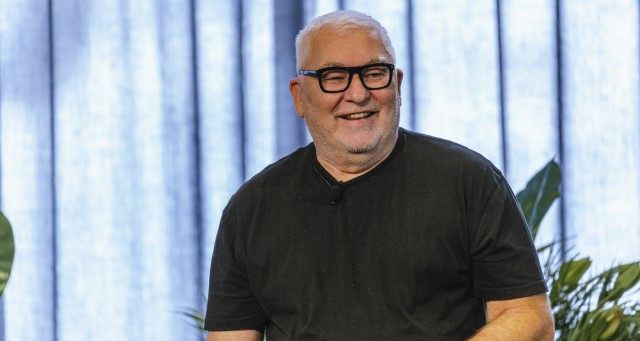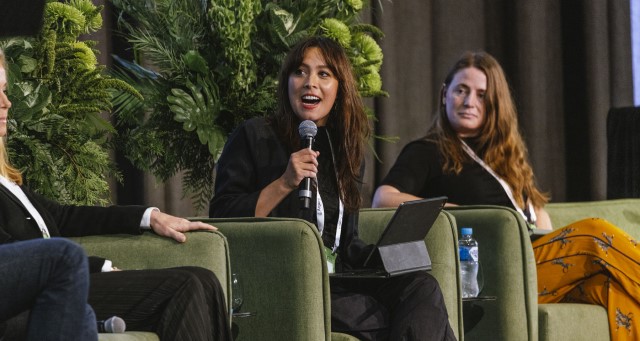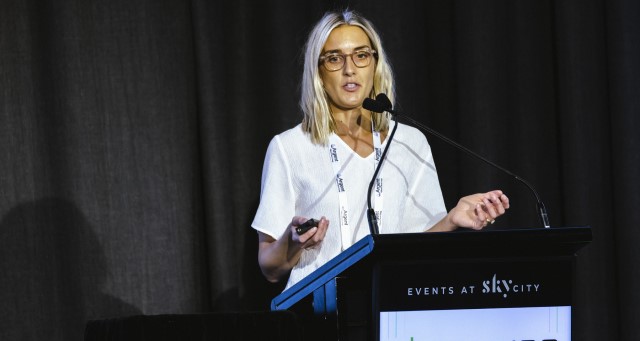The heavy hitters of the Australasian hotel and design community gathered at Skycity Adelaide on Tuesday May 2 for the 2023 Design Inn Symposium.
Over 250 delegates were in attendance for the 2023 event, which was hosted by HM magazine, co-hosted by the South Australian Tourism Commission, with support from GROHE as the event’s Principal Partner.
The conference presented a deep dive into the world of hotel design and construction, from humble lead-free tap fittings to the ground-up construction of state-of-the-art environmentally efficient buildings.
To the seductive aromas of barista coffee and fresh pastries, proceedings began with a no-holds-barred panel discussion on ‘The Lay of The Land’ where the challenges and trends of hotel construction were tackled by an industry brains trust moderated by Marie Colangelo of Salter Brothers.
If 2022 was a prelude to sustainability, then 2023 confirmed the gnarly topic had reached maturity.
Tim Sherlock from Pro-Invest reinforced this by launching the discussion with “Sustainability has to be embedded in any project. It’s no longer just a tick box, clients (and regulations) are demanding it.”
Karen Wales observed that while “sustainability can be hard to commercialise” it cannot be ignored due in no small part to rapidly adapting building codes, making newbuild projects more complex and, according to David Radford of Essence Project Management, leading developers to repurpose existing buildings rather than begin ‘greenfield’ projects.
While the term ‘Passive House’ may be familiar to those on the inside of the hotel industry, many of the more nuanced concepts are yet to be fully grasped in this volatile environment. Fortunately for the assembled delegates, Bruce Redman Becker, the owner, developer and architect of the groundbreaking hotel renovation and repurposing that became the Hotel Marcel in New Haven, Connecticut, was on hand to describe the challenges he faced which ultimately became his triumphs.
“The 50-year-old building had sat vacant since 1998,” Becker said via satellite link, “so we had some work to do, but retained a reuse imperative throughout to preserve this significant structure designed by the famous modernist architect Marcel Breuer.”
The outstanding result now serves as a benchmark for sustainable architecture in the true ‘Passive House’ mould.
Clare Parry, founder of the Australian Passive House Association further elaborated by outlining the key tenets of Passive House namely, to be safe, comfortable and efficient throughout and faithful to sustainable building practices.
Next, Chris Sanderson, co-founder of The Future Laboratory spoke with HM Magazine editor, Ruth Hogan, about ‘next gen’ hotels where he emphasised the blurring of business and leisure markets, referred to euphemistically as ‘bleisure’ travel, is moving away from the stereotypical ‘city stay’.
“Much of this is due to the growth of the so-called ‘digital nomads’ who are looking for a space that is neither bland co-working desk nor hotel room,” says Sanderson, “and here the onus is on the hospitality provider to create a distinct hotel experience – a reason for the guest to be there – and curate touchpoints that deliver a sense of place and community.”
A prelude to morning tea was from Antoine Besseyre des Horts from Lixil Global Design whose interior projects centred around the bathrooms, particularly with the quality and innovative Grohe fittings.
“The innovative reimagining of the bathroom can transform this space from purely functional to emotional by taking fixtures beyond simply water-efficient products and carefully merging the traditional bed and bath spaces,” he said.
The much-anticipated Design Showcase was revealed as Sydney’s soon-to-be-opened W Hotel in Darling Harbour. Presented by Director of Interior Design at Marriot International, Alicia Lynch, the design criteria of historical, physical and social held true to W’s fundamental tenet of ‘luxury, liberated’ and hotels that ‘defy expectations’.
Working in conjunction with UK-based interior design consultancy, Bowler James Brindley, the overarching ribbon motif was conceived to portray the sculptural, floral and surf emblems that define Sydney and its iconic harbour.
“The Living Room is modelled on the colourful jumble of the bowerbird,” says Lynch, ”while The Great Room will ‘explode’ in fireworks designs.”
Slated to open in October 2023, the 585-room W Sydney will be one of the most high-profile hotel openings the harbour city has seen.
Just because a hotel brand enjoys success in an overseas market, doesn’t guarantee its success in Australia. This was one of the key takeaways from the ‘New Brands’ panel discussion moderated by Rosie Morley of Fender Katsalidis.
Several hotel brands are soon to debut in the Australian market including Interlude, Dorset, Ritz Carlton and Moxy. The Moxy will open soon in the airport precinct at Mascot.
“It was not an easy journey,” said Corval director, Chris Boys, of the 300-room Moxy “but the big risk is paying off.”
CHADA creative director, Juliet Ashworth, was more upbeat about her part in the recent billion-dollar redevelopment of the Pentridge Precinct in Melbourne.
“It was a challenge to honour the painful and tragic legacy without being sad,” said Ashworth, “but we were able to adopt a transcendent, joyful and harmonious atmosphere in the public spaces with thoughtful design within permissible limits.”
Even the perennial F&B did not escape examination by a panel moderated by Atypical Agency Director, Alison Hulm. Samantha Eades of Mitchell Eades met the question head-on asserting that chain hotels were not necessarily conducive to F&B offerings and ran the risk of being boring. Scott Brown of Housemade Hospitality offered some insight by noting that while the F&B scene is exciting, it can be a challenge to deal with operators and emphasised the need to design with both guest and operator in mind.
You could hear a pin drop when acclaimed design leader and author, Tim Kobe, took to the stage for his keynote presentation, Return on Experience.
As the designer of the original Apple Store, Kobe recalled the doubt and derision cast his way when the first store opened in 2001. The rest, as they say, is history.
“Design helps define human progress,” Kobe reminded the silent room, “and solutions are just as easy to find as problems are created.”
There were so many golden takeaways, but the one that echoed long after his final words was “don’t do the right thing, do the brave thing” – a quote by art direction guru, Lee Clow, that may well be hanging on some walls next week.
The second design showcase featured the recently revealed Capella Hotel, built into the heritage-listed former Department of Education building in Sydney’s historic sandstone precinct.
Michelle Evans of Make Architects was clearly proud of her team’s contribution to this staggering $335m, seven-year project that required considerable remodelling and reparation to a building protected by strict heritage provisions.
“The original sandstone structure was in remarkably good condition,” said Evans, “but we had to strip back the structure to the bones and rebuild every part of the building from its purely functional state to what we have today. For example, the interior directory boards were repurposed as art fixtures incorporating work by indigenous artist, Judy Watson.”
Modular hotel builds were a feature of the ‘Disruptor’ panel discussion moderated by Reece Ambassador, Loren Inglis.
“While they have been done elsewhere in the world, modular hotel builds have allowed us to really push the boundaries in the Australian space,” says Caspar Schmidt, founder and CEO of Motif/Wild Modular, “We’ve been able to overcome difficult site access and still deliver affordable guest experiences.”
Buchan’s Valerie Mack touched on the rise of AI in hotels. “Are we ready to be greeted by a robot?” she asks, “Probably not. But AI can help free up front-of-house and back-of-house staff and leave them to deal with the business of people.”
Older assets nearing end-of-life were a consistent topic in many of today’s discussions and it was again in the ‘Operators’ panel discussion moderated by Angela Biddle of Fender Katsalidis. Recent spiralling construction costs and the management of consultants also provoked reactions from our panel.
“You need to push for the desired outcome with consultants,” said Nic Dingle of Ascott Australia, “and make sure to achieve both design and operational outcomes.”
The final masterclass was delivered by Cliff Rip of Suede Interiors who detailed the considerable effort undertaken by Crystalbrook Kingsley in winning the 2022 Australasia Pacific Hotel Design Award.
The conference closed with the presentation of the 2023 Australasia Pacific Hotel Design Awards, which saw QT Newcastle recognised with a Highly Commended award for its creative design.
The Porterhouse Hotel, Sydney took home the award for New Build Hotel of the Year, as well as the overall 2023 Paul Davis Award for the Australasia-Pacific Hotel of the Year.
Judges said: “This hotel in Sydney is a wonderfully contrasting and layered design that bridges the contemporary and the historical without being disingenuous to either. The new-build architecture captures the spirit of the neighbourhood by effortlessly slotting this volume into the cityscape, comfortably creating a familiar architectonic that doesn’t scream for attention. Passing through the public spaces evokes delight in the discovery, with the considered layering of the design providing moments for each visitor that resonates with dexterity.”
The Hotel of the Year – Conversion award went to recently-opened budget accommodation concept Lylo Auckland; and the Hotel of the Year – Refurbishment was awarded to NSW Southern Highlands’ property Osborn House.




